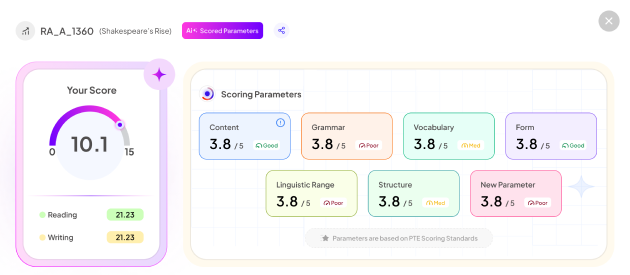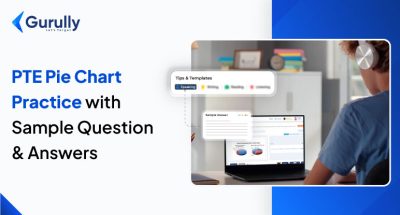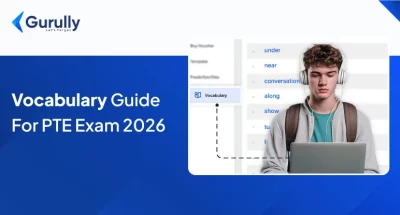For those who are going to take the PTE exam on 7th August or later then you must be aware of the addition of two new question types in PTE speaking section. As the question is recently added, you must be wondering how to prepare and what to do to score high in PTE Summarize Group Discussion. You can prepare this task with Gurully’s latest updated PTE mock test, and to know how, read the blog.
This task has a completely new format in which your listening, critical thinking, and communication skills will be evaluated. But not to worry, here is a detailed guide from the format of the task to sample questions and answers. Check this exam expert-curated guide, and start practicing PTE Summarize Group Discussion on Gurully now.
What is PTE Summarize Group Discussion?
In this task, you will hear an audio in which you will listen to a group of 3 people discussing a topic. Once the audio finishes, you will have 10 seconds to prepare and 2 minutes to summarize the discussion and speak. In this task, you have to speak about the main points, capture opinions or outcomes. The audio will play only once.
| Prompt Length | Skills Assessed | No. of Questions |
| Up to 3 Minutes | Listening and Speaking | 2-3 |
PTE Summarize Group Discussion Template to Use:
A well-structured response makes a big difference. You can follow this PTE Summarize Group Discussion template while answering
- Introduction of the topic
- Begin by stating what the discussion was about.
- Present key perspectives
- Mention the key opinions or ideas raised by each speaker.
- Wrap up with an outcome or conclusion (if any)
- If the discussion led to any agreement or conclusion, include it.
Sample Response Using Template:
“The discussion was about implementing a recycling system on campus. One speaker supported the idea and suggested adding more bins to encourage participation. The other raised concerns about the budget and logistics. They agreed to propose a pilot program before expanding it across the university.”
How Scoring Works
Your performance in this task affects your scores in both the Speaking and Listening modules. Scoring is done based on partial credit, and the criteria for scoring are as follows:
Start your free PTE mock test with Gurully and get AI-powered analysis for a personalized journey.


- Kickstart your PTE prep with a free AI-scored mock test
- Boost your score with in-depth analysis & smart recommendations
Content:
| Score | What It Means |
| 6 | Clear, accurate summary of all main points; paraphrased well; includes comparisons between speakers; highly logical & fluent. |
| 5 | Mostly accurate summary with some minor slips; paraphrasing mostly correct; partial comparisons; good vocabulary and structure. |
| 4 | Main ideas covered, but some mistakes or focus on less important details; weak comparisons; basic vocabulary; structure may falter. |
| 3 | Limited understanding; some repetition from audio; key points may be missed or misunderstood; poor flow. |
| 2 | Incomplete or mostly inaccurate; depends heavily on copied phrases; lacks key ideas; hard to follow. |
| 1 | Only a few repeated words/phrases; almost no meaningful content; no structure or idea clarity. |
| 0 | Too short or irrelevant to give any score. |
Oral Fluency:
| Score | What It Means |
| 5 | Highly fluent; natural rhythm, no pauses or hesitations. |
| 4 | Advanced; minor hesitations, but flow remains smooth. |
| 3 | Good; understandable with some unnatural pauses or fillers. |
| 2 | Intermediate; noticeable pauses or slow pace; flow interrupted. |
| 1 | Limited; hesitant, slow, or difficult to follow. |
| 0 | Diffluent; speech is broken, very hard to follow. |
Pronunciation:
| Score | What It Means |
| 5 | Native-like pronunciation; clear and natural throughout. |
| 4 | Advanced pronunciation; mostly accurate with a few slips |
| 3 | Good; understandable with some errors. |
| 2 | Intermediate; many mispronunciations, but listener can follow. |
| 1 | Poor clarity; difficult to understand. |
| 0 | Impossible to understand or non-English sounds. |
PTE Summarize Group Discussion Tips:
First, Focus on Listening
- Never try to plan your answer while listening to audio, as it will lead to missing the details. Try paying full attention during listening and identify key ideas, opinions, and the conversation flow.
Identify the Structure of Topic of Discussion:
- Listen what is the topic of discussion, and how many people are supporting, what was the conclusion or resolution of the discussion, did they agreed or disagreed on the topic. By checking all these points, you will be able to frame a high-scoring response.
Use Linking Phrases:
- While summarizing the discussion, try to use linking phrases to increase fluency. Use phrases like “The discussion focused on,” “One speaker mentioned,” and “They concluded that,” etc. It will also increase fluency scores.
Speak Naturally, Not Perfectly:
- If you are not a native English speaker, do not worry, and speak in your natural voice. Try to speak with a steady pace and avoid long pauses.
Stay Within Time Limit:
- Always keep a check on time, as you will only have 2 minutes to speak and 10 seconds to prepare. Try to utilize the complete 2 minutes and cover all your points in those minutes only.
Practice with Real Scenarios:
- For practicing this task prepare on Gurully for free. Get familiar with different accents, tones, and topics, as it will help in boosting your confidence.
Build a Phrase Bank:
- Have ready-to-use sentence starters and transitions. This saves time and makes your speech more coherent under pressure.
Apply all these tips while practicing on Gurully’s updated PTE Academic mock test & evaluate your performance.
Watch YouTube Video:
PTE Summarize Group Discussion Sample Question & Answers
Audio 1:
Answer:
The students discussed strategies for managing group projects effectively. One student shared frustration about past experiences with unequal contribution. Suggestions included setting clear roles and deadlines, dividing tasks based on strengths, and holding regular check-ins to track progress. They also recommended using shared documents or project management apps to stay organized. They agreed on addressing non-contributors early and informing the professor if needed. Overall, they emphasized communication and planning to make group projects less stressful.
Audio 2:
Answer:
The students discussed ways to cope with exam stress at university. One student admitted struggling with sleepless nights and overthinking. Suggestions included making a study schedule, taking breaks, exercising, and practicing mindfulness through apps or breathing exercises. Avoiding distractions like social media and balancing study with relaxation were also recommended. They agreed that healthy habits and seeking support when needed are key to managing stress and maintaining well-being during exams.
Audio 3:
Answer:
The students discussed joining extracurricular clubs at university. One student debated between fun clubs like drama or photography and career-focused options. Another recommended choosing based on enjoyment, saying employers value well-rounded students. A third suggested balancing passion and strategy by selecting clubs that build useful skills. They also shared tips for managing time, like joining one club per semester and treating it as “me time.” Ultimately, they agreed that clubs offer valuable networking and personal growth opportunities.
Audio 4:
Answer:
The students discussed how to manage group presentations more effectively. They shared past struggles with disagreements and uneven workloads. Suggestions included setting clear roles and deadlines, creating shared documents, and holding regular check-ins to maintain accountability. They also recommended rehearsing together, dividing speaking parts by strengths, and improving slides with visuals and consistent design. Using timers during practice was suggested to balance timing. They agreed that early planning and teamwork could make presentations less stressful and more professional.
Audio 5:
Answer:
The students discussed time management struggles at university. One student felt overwhelmed balancing classes, assignments, and part-time work. Suggestions included using planners, digital tools like Google Calendar, and setting small daily goals to make tasks manageable. They emphasized scheduling downtime to avoid burnout and finding a personal rhythm. One preferred paper lists, while another used color-coded calendars for deadlines. They agreed consistency and flexibility are key, and taking breaks helps maintain focus and productivity.
Audio 6:
Answer:
The students discussed how to make internships more valuable. One expressed concern about being given menial tasks, while others advised being proactive, asking questions, and showing enthusiasm to gain meaningful work. They highlighted the importance of networking across departments to understand the industry and build connections. Handling mistakes professionally and keeping a journal of daily learning were also suggested. They agreed internships are a learning experience to explore interests, develop confidence, and potentially secure future job opportunities.
Audio 7:
Answer:
The students discussed different note-taking methods used at university. One student shared that writing down everything from lectures felt overwhelming during revision. Another suggested the Cornell Method, which organizes notes into sections for key points, cues, and summaries, making it easier to study later. A third student preferred mind mapping, as it helps visualize connections between concepts, especially in subjects like history or biology. They mentioned using apps to keep mind maps tidy and switching to outline formats for dense content like law. Another idea shared was recording lectures and rewriting them in their own words later, though it requires discipline to avoid accumulating hours of unused audio. The students agreed there’s no single best method, emphasizing the importance of experimenting with different approaches to find what works. They concluded that consistency and adapting strategies to suit each subject are essential for effective note-taking and revision.
Audio 8:
Answer:
The students discussed effective strategies for preparing for final exams. One student expressed feeling overwhelmed by the amount of material and unsure where to begin. Another suggested creating a detailed study plan, breaking subjects into smaller chunks, and assigning specific days for revision to make it manageable. A third student emphasized active recall methods like using flashcards and practicing past papers, which they found more effective than simply rereading notes. The group also talked about study groups, with one finding them helpful for clarifying concepts, while another preferred studying alone to stay focused. They highlighted the importance of taking breaks to avoid burnout, with the Pomodoro technique mentioned as a useful method. Finally, they agreed on the need to maintain physical and mental health by prioritizing sleep, proper nutrition, and exercise. Overall, they concluded that a balanced approach combining planning, active revision techniques, and self-care is key to performing well during finals.
Audio 9:
Answer:
The students discussed how to choose research topics for their assignments. One student felt stuck, worrying about picking a topic that was either too broad or too narrow. Another suggested brainstorming areas of personal interest and then checking for sufficient literature to ensure the topic is feasible. A third recommended focusing on current issues to make the research more relevant and engaging. They also agreed that originality doesn’t always mean finding an entirely new idea; instead, it can involve taking a unique angle or asking fresh questions on familiar topics. Consulting professors early was highlighted as a helpful step, as they can provide guidance on refining the scope and shaping a solid research question. By the end of the discussion, the students agreed that creating a shortlist of potential topics and exploring their viability would make the process less overwhelming. They emphasized that choosing a topic carefully lays a strong foundation for a successful assignment.
Audio 10:
Answer:
The students discussed the challenges and benefits of participating in class discussions. One student shared their struggle with contributing, feeling intimidated and often second-guessing their ideas. Another suggested preparing in advance by noting key points or questions from readings, which made it easier to speak up during class. A third student highlighted that professors value engagement over perfect answers and recommended contributing even small comments or questions. They also mentioned online forums as a less stressful way to participate, while encouraging gradual practice to build confidence for live discussions. Another tip was to rehearse points mentally and wait for pauses to join the conversation. The group agreed that participation enhances critical thinking and learning, and mistakes should be seen as opportunities rather than failures. They concluded that starting small, preparing ahead, and being consistent are key steps toward becoming more comfortable and active in class discussions.
PTE summarize group discussion is newly added in in speaking section of PTE Academic, so you must practice from an authentic platform only. Gurully has a team of exam experts who curate mock tests and section-wise tests according to the latest updates and format of Pearson. Gurully’s PTE practice test provides a full-length mock test with real exam simulation. You will get instant & accurate results that will help you in understanding your performance. With detailed feedback, you will be able to streamline the preparation to achieve your target score.
Conclusion:
The new PTE Summarize Group Discussion task may feel unfamiliar, but with the right approach and practice, you can master it easily. Focus on listening carefully, structuring your response well, and speaking clearly within the time limit. Gurully’s updated PTE mock test platform offers real-exam simulations, expert-designed questions, and instant feedback to help you prepare effectively. Start practicing today by taking one PTE mock test free and boost your confidence for test day.
FAQ:
How to summarize a group discussion?
What is group discussion in PTE?
How to get 79+ in PTE Writing?
How much is 52 in PTE score?
Is PTE accepted in Australia?
Also Read:
- PTE Academic Describe Image: Tips, Types, and Sample Question with Answers
- Learn 59+ Dictation Words For PTE Exam To Score High
- Introduction In PTE – Things You Need To Know For Making A Strong Impression







